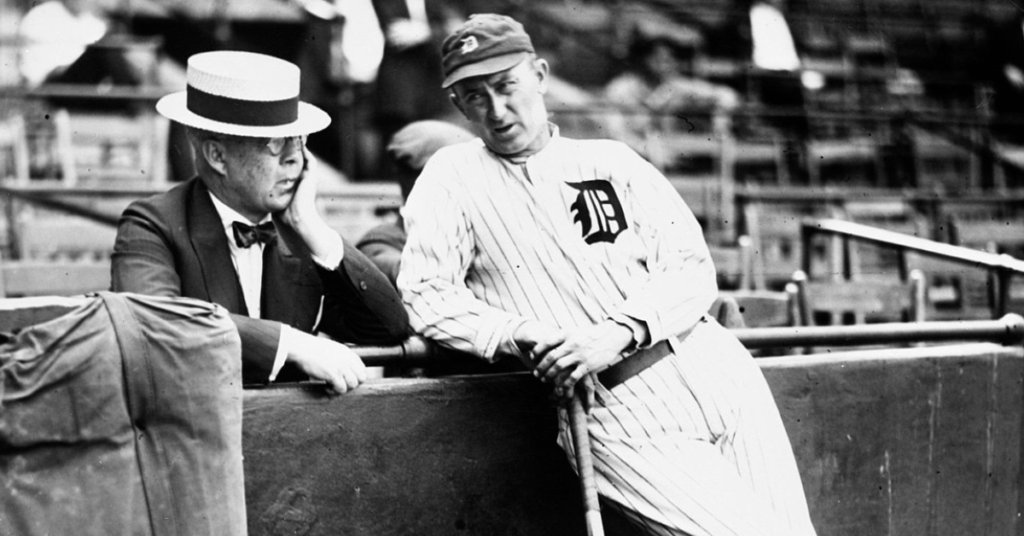
The Extraordinary Ty Cobb: Baseball’s First Millionaire

Ty Cobb, one of the greatest baseball players in history, isn’t just remembered for his incredible skill on the field, but also for his remarkable fortune and business acumen off it. Cobb, famously known as “The Georgia Peach,” played an instrumental role in shaping Major League Baseball (MLB) and left behind a legacy that extended far beyond the diamond.
The Man Behind the Legend
Born in rural Georgia in 1886, Ty Cobb’s early life was marked by tragedy. His father, William, an educator and state senator, initially discouraged Cobb’s aspirations to become a baseball player, urging him to pursue a more academic path instead. However, Cobb’s dreams would eventually prevail. Just weeks before Cobb made his MLB debut in 1905, his mother accidentally shot and killed his father, mistaking him for an intruder. This traumatic event haunted Cobb throughout his life, and some say it played a role in shaping his intense and often volatile personality.
Despite the emotional turmoil, Cobb rose to become one of baseball’s most dominant figures. His career batting average of .366 remains the highest in MLB history, and his total of 4,189 hits has only been surpassed by a handful of players. Cobb played primarily for the Detroit Tigers, where his scientific approach to hitting and baserunning set new standards for the sport. He was aggressive, strategic, and unrelenting—a fierce competitor both on and off the field.
Baseball Career and Style: Redefining the Game
Cobb’s style of play was revolutionary. He meticulously studied pitchers and adapted his batting stance based on their tendencies. As a baserunner, he was equally calculated but also aggressive. Cobb would often sharpen his spikes before sliding into bases, intimidating fielders and forcing errors. Over his 24-season career, Cobb set 90 MLB records, including an impressive streak of 23 consecutive seasons hitting over .300.
Between 1907 and 1919, Cobb led the Detroit Tigers to three American League pennants, establishing himself as the first true baseball superstar. His finest season came in 1911, when he hit .420, stole 83 bases, and drove in 127 runs—an extraordinary feat in the Dead Ball Era, when power hitting was not the norm. He would also win the Triple Crown in 1909, leading the league in batting average, home runs, and RBIs.
Despite his success on the field, Cobb’s reputation was not without controversy. Known for his fiery temperament, Cobb was involved in several on-field brawls and often alienated teammates with his aggressive behavior. He once famously attacked a disabled heckler in the stands in 1912. His desire to win at all costs earned him both admirers and critics throughout his career.
A Business Savvy Legend
While Cobb’s legacy is intertwined with his exceptional baseball skills, it’s his shrewd business sense that truly sets him apart from many of his contemporaries. Cobb was an early investor in some of the most iconic companies of the 20th century. In the 1910s, he purchased large blocks of stock in Coca-Cola, then still a young company, as well as shares in General Motors and various rubber companies. His investment strategy proved to be incredibly successful, making Cobb baseball’s first millionaire.
At the time of his death in 1961, Cobb’s net worth was estimated at $32 million—equivalent to roughly $340 million today, when adjusted for inflation. His Coca-Cola stock alone was valued at $12 million (about $100 million today). His wealth, however, was not simply accumulated for personal gain; Cobb also gave back to his community and the sport that made him famous.
Philanthropy and Lasting Impact
Cobb used much of his wealth for charitable purposes. In his will, he set aside a portion of his fortune to establish the Cobb Educational Foundation, which provides college scholarships to Georgia students. Since its founding, the foundation has awarded over $15 million in scholarships, helping thousands of students pursue higher education.
Additionally, Cobb donated a significant portion of his Coca-Cola shares to create the Ty Cobb Healthcare System. Today, this network of eight full-service hospitals and care facilities throughout Georgia serves countless residents, and the local community in Royston, Georgia, fondly refers to the hospital as “the one built with a bat.”
Cobb’s Legacy: Beyond Baseball
After retiring from baseball, Cobb briefly managed the Detroit Tigers from 1921 to 1926 and later worked to soften his controversial image. He became more reflective about his career and acknowledged some of the regrets related to his aggressive style. Cobb’s influence on the game, however, is undeniable. He is credited with popularizing the stolen base as an offensive weapon and demonstrating the effectiveness of the hit-and-run play.
Even as modern analysis questions some aspects of his game—such as his modest power numbers and average defensive statistics—his hitting ability remains virtually unmatched in baseball history. His records for games played, at-bats, runs, hits, and stolen bases stood for decades, and his approach to the game continues to inspire players today.
Final Thoughts
Ty Cobb’s story is one of extraordinary athletic achievement, personal tragedy, and incredible financial success. While his aggressive nature and complicated personality made him a controversial figure during his playing days, his legacy as a baseball icon and savvy businessman endures. His investments, charitable contributions, and lasting influence on the game cement him as one of the most fascinating figures in American sports history.
Cobb’s life and career demonstrate that greatness in sports doesn’t always come with an easy path. His legacy, however, proves that with talent, determination, and a bit of foresight, one can leave a lasting impact on both the game and the world beyond it.
